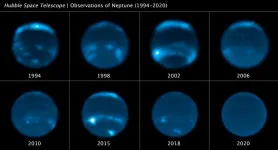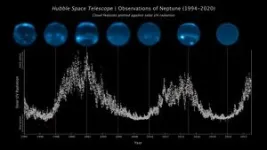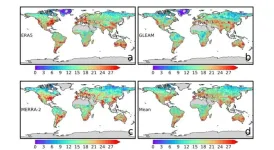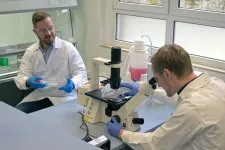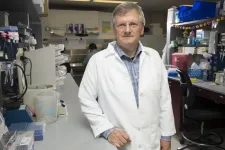(Press-News.org) Astronomers have uncovered a link between Neptune's shifting cloud abundance and the 11-year solar cycle, in which the waxing and waning of the Sun's entangled magnetic fields drives solar activity.
This discovery is based on three decades of Neptune observations captured by NASA's Hubble Space Telescope and the W. M. Keck Observatory in Hawaii, as well as data from the Lick Observatory in California.
The link between Neptune and solar activity is surprising to planetary scientists because Neptune is our solar system's farthest major planet and receives sunlight with about 0.1% of the intensity Earth receives. Yet Neptune's global cloudy weather seems to be driven by solar activity, and not the planet's four seasons, which each last approximately 40 years.
At present, the cloud coverage seen on Neptune is extremely low, with the exception of some clouds hovering over the giant planet's south pole. A University of California (UC) Berkeley-led team of astronomers discovered that the abundance of clouds normally seen at the icy giant's mid-latitudes started to fade in 2019.
"I was surprised by how quickly clouds disappeared on Neptune," said Imke de Pater, emeritus professor of astronomy at UC Berkeley and senior author of the study. "We essentially saw cloud activity drop within a few months," she said.
"Even now, four years later, the most recent images we took this past June still show the clouds haven't returned to their former levels," said Erandi Chavez, a graduate student at the Center for Astrophysics | Harvard-Smithsonian (CfA) in Cambridge, Massachusetts, who led the study when she was an undergraduate astronomy student at UC Berkeley. "This is extremely exciting and unexpected, especially since Neptune's previous period of low cloud activity was not nearly as dramatic and prolonged."
To monitor the evolution of Neptune's appearance, Chavez and her team analyzed Keck Observatory images taken from 2002 to 2022, the Hubble Space Telescope archival observations beginning in 1994, and data from the Lick Observatory in California from 2018 to 2019.
In recent years, the Keck observations have been complemented by images taken as part of the Twilight Zone program and by Hubble's Outer Planet Atmospheres Legacy (OPAL) program.
The images reveal an intriguing pattern between seasonal changes in Neptune’s cloud cover and the solar cycle – the period when the Sun's magnetic field flips every 11 years as it becomes more tangled like a ball of yarn. This is evident in the increasing number of sunspots and increasing solar flare activity. As the cycle progresses, the Sun’s tempestuous behavior builds to a maximum, until the magnetic field beaks down and reverses polarity. Then the Sun settles back down to a minimum, only to start another cycle.
When it's stormy weather on the Sun, more intense ultraviolet (UV) radiation floods the solar system. The team found that two years after the solar cycle's peak, an increasing number of clouds appear on Neptune. The team further found a positive correlation between the number of clouds and the ice giant's brightness from the sunlight reflecting off it.
"These remarkable data give us the strongest evidence yet that Neptune's cloud cover correlates with the Sun’s cycle," said de Pater. "Our findings support the theory that the Sun's UV rays, when strong enough, may be triggering a photochemical reaction that produces Neptune’s clouds."
Scientists discovered the connection between the solar cycle and Neptune's cloudy weather pattern by looking at 2.5 cycles of cloud activity recorded over the 29-year span of Neptunian observations. During this time, the planet's reflectivity increased in 2002 then dimmed in 2007. Neptune became bright again in 2015, then darkened in 2020 to the lowest level ever observed, which is when most of the clouds went away.
The changes in Neptune's brightness caused by the Sun appear to go up and down relatively in sync with the coming and going of clouds on the planet. However there is a two-year time lag between the peak of the solar cycle and the abundance of clouds seen on Neptune. The chemical changes are caused by photochemistry, which happens high in Neptune's upper atmosphere and takes time to form clouds.
"It's fascinating to be able to use telescopes on Earth to study the climate of a world more than 2.5 billion miles away from us," said Carlos Alvarez, staff astronomer at Keck Observatory and co-author of the study. "Advances in technology and observations have enabled us to constrain Neptune's atmospheric models, which are key to understanding the correlation between the ice giant's climate and the solar cycle."
However, more work is necessary. For example, while an increase in UV sunlight could produce more clouds and haze, it could also darken them, thereby reducing Neptune's overall brightness. Storms on Neptune rising up from the deep atmosphere affect the cloud cover, but are not related to photochemically produced clouds, and hence may complicate correlation studies with the solar cycle. Continued observations of Neptune are also needed to see how long the current near-absence of clouds will last.
The research team continues to track Neptune's cloud activity. "We have seen more clouds in the most recent Keck images that were taken during the same time NASA's James Webb Space Telescope observed the planet; these clouds were in particular seen at northern latitudes and at high altitudes, as expected from the observed increase in the solar UV flux over the past approximately 2 years," said de Pater.
The combined data from Hubble, the Webb Space Telescope, Keck Observatory, and the Lick Observatory will enable further investigations into the physics and chemistry that lead to Neptune's dynamic appearance, which in turn may help deepen astronomers' understanding not only of Neptune, but also of exoplanets, since many of the planets beyond our solar system are thought to have Neptune-like qualities.
The findings are published in the journal Icarus.
The Hubble Space Telescope is a project of international cooperation between NASA and ESA. NASA's Goddard Space Flight Center in Greenbelt, Maryland, manages the telescope. The Space Telescope Science Institute (STScI) in Baltimore conducts Hubble science operations. STScI is operated for NASA by the Association of Universities for Research in Astronomy, in Washington, D.C.
END
Neptune's disappearing clouds linked to the solar cycle
2023-08-29
ELSE PRESS RELEASES FROM THIS DATE:
Liver-targeting drug reverses obesity, lowers cholesterol in mice
2023-08-29
A University of Massachusetts Amherst biomedical engineer has used a nanogel-based carrier designed in his lab to deliver a drug exclusively to the liver of obese mice, effectively reversing their diet-induced disease.
“The treated mice completely lost their gained weight, and we did not see any untoward side effects,” says S. Thai Thayumanavan, distinguished professor of chemistry and biomedical engineering. “Considering 100 million Americans have obesity and related cardiometabolic disorders, we became pretty excited about this work.”
Efforts ...
MIND Institute director calls for new approach to equity in autism, fragile X research
2023-08-29
UC Davis MIND Institute Director Leonard Abbeduto is calling for a major shift in the way research into autism and other neurodevelopmental disabilities is conducted. He co-authored a paper titled “Toward Equity in Research on Intellectual and Developmental Disabilities” that was the basis for a special issue of the American Journal on Intellectual and Developmental Disabilities. The issue was published today.
Abbeduto, a distinguished professor in the Department of Psychiatry and Behavioral Sciences, argues that researchers ...
Rapid shifts from drought to downpour occurring more often
2023-08-29
New research shows that wild swings from severe drought to heavy rains are becoming more common with climate change in many parts of the world and that feedback loops from the land itself are likely contributing to the trend.
The research looked at four decades of meteorological and hydrological data on a global level and found seven regional hotspots around the world where the trend was getting worse: eastern North America, Europe, East Asia, Southeast Asia, southern Australia, southern Africa, and southern South America.
“We are especially concerned with the sudden shift from drought to flood,” said coauthor Zong-Liang Yang, a professor at The University of Texas at Austin Jackson ...
Hemp helps to heal
2023-08-29
A few days ago, the federal government took the controversial decision to make the acquisition and possession of small amounts of cannabis exempt from punishment. Provided the German parliament approves the draft bill, the “Cannabis Act” will come into force next year. While some consider this move to be long overdue, others continue to warn strongly against the health risks of cannabis use.
The Jena researchers and their colleagues are now taking a different look at cannabis – at the traditional medicinal ...
Department of Energy announces $24 million for research on quantum networks
2023-08-29
WASHINGTON, D.C. - Today, the U.S. Department of Energy (DOE) announced $24 million in funding for three collaborative projects in quantum network research.
Scientific research infrastructure linked with quantum networks is needed to realize distributed quantum computers. These quantum computers could simulate complex scientific processes inaccessible to computational platforms of today, integrate quantum sensors that promise measurements of unprecedented precision, and address previously inaccessible scientific questions of importance.
“Advances in quantum networking are enabling effective interconnections ...
A new fly model developed to find treatments for UBA5 deficiency, a rare epileptic brain disorder
2023-08-29
Developmental and epileptic encephalopathy (DEE) refers to a group of neurodevelopmental conditions characterized by developmental delay, cognitive impairment, and seizures in children. In 2016, the first case linking variants in both the copies of UBA5 gene to DEE44 was reported. Since then, twelve distinct missense variants in the UBA5 gene have been identified in 25 patients. A recent study by Dr. Hugo J. Bellen and his team at the Jan and Dan Duncan Neurological Research Institute (Duncan NRI) at Texas Children’s Hospital and Baylor College of ...
Statewide project to provide care and support to people living with dementia and their care partners
2023-08-29
INDIANAPOLIS—An Indiana University School of Medicine statewide project in collaboration with Indiana University Health was recently funded to support people living with dementia as well as their family care partners find more support and resources, thanks to a new $686,000 grant from the National Institute on Aging IMPACT Collaboratory.
The Aging Brain Care Virtual program will be the first study to test dementia collaborative care in Indiana University Health primary care. The project will utilize the ...
Magnitude of placebo response identified in drug for treatment of hot flashes
2023-08-29
WACO, Texas (Aug. 29, 2023) – Hot flashes are one of the most concerning and most reported symptoms among menopausal women and breast cancer survivors. Currently, paroxetine is a FDA-approved non-hormonal drug used for the treatment of hot flashes. In an article published this month in the journal Frontiers in Psychiatry, researchers at Baylor University tested the efficacy of paroxetine by conducting a systematic review and meta-analysis of six clinical trials, finding that the benefits of paroxetine in the treatment of hot flashes to be comparable to that of the placebo response.
The study included information ...
Presenting non-traditional symptoms, women suffer worse heart disease outcomes than men
2023-08-29
Media Contacts:
Emily Gowdey-Backus, director of media relations
Nancy Cicco, assistant director of media relations
More than a dozen medical studies from around the globe show women suffer worse outcomes when diagnosed with and treated for cardiac issues – the No. 1 killer in the world according to the Centers for Disease Control.
The discrepancy, as summarized by UMass Lowell biomedical and nutritional sciences Associate Professor Mahdi O. Garelnabi of the Zuckerberg College of Health Sciences and colleagues from the University of Maryland School of Medicine, Lebanese American ...
Researchers prep fentanyl, heroin vaccines for human trials
2023-08-29
MISSOULA – Researchers at the University of Montana and their partners are nearing human trials for vaccines to prevent fentanyl and heroin drug overdoses.
The vaccines would protect people struggling with drug addiction or those at risk of accidental overdose. According to the National Institutes of Health, more than 106,000 U.S. drug overdose deaths were reported in 2021. Of those, 71,000 can be attributed to synthetic opioids like fentanyl.
Researcher Jay Evans directs the UM Center for Translational Medicine, which is ...
